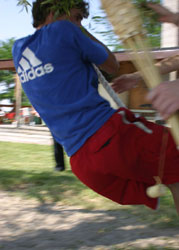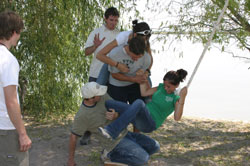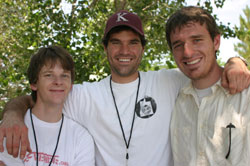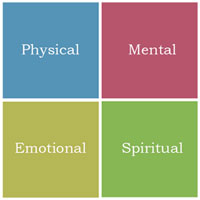Life Youth Adventures and Training FAQ
In an environment of love, discovery, and adventure we inspire and empower youth to achieve excellence.
Questions
- Why does LIFE offer Youth training programs separate from the Family programs?
- So does LIFE recommend that family members attend individual trainings before engaging in a Family Training Program?
- What types of activities can my son or daughter anticipate participating in during the Youth Training?
- How does LIFE ensure the safety of my child?
- What about the staff for the Youth Trainings? What qualifications do they possess?
- What are some of the skills and resources I can expect my teen to return home with?
- In the opinion of LIFE what constitutes a Youth of Excellence?
- All of your trainings seem to pay significant attention to what you refer to as "The Four Areas of Need." Why is that?
Answers
Q: Why does LIFE offer Youth training programs separate from the Family programs?
A: As our name indicates, the Life Institute for Family Excellence is about families, first and always. Families are made up of individuals, parents and children. The Family Training helps create a wonderfully effective team and framework within which individual members can thrive and find security and joy.
 The more personal growth the individual members can achieve, the more they will bring to the family as a whole, and the better they will prepare themselves for long-term individual success in life. This growth and learning is the process of a lifetime that never really stops. So everything a child learns in a Life Youth Training, or that a parent learns in a LIFE Couples Training becomes more fuel for the family and individual to use in their journeys to excellence.
The more personal growth the individual members can achieve, the more they will bring to the family as a whole, and the better they will prepare themselves for long-term individual success in life. This growth and learning is the process of a lifetime that never really stops. So everything a child learns in a Life Youth Training, or that a parent learns in a LIFE Couples Training becomes more fuel for the family and individual to use in their journeys to excellence.
We might look at it as a process in which each member brings all of their skill, experiences, and knowledge to the family and, in an effective family structure, the results of all the contributions become infinitely greater than just the sum of the individual parts.
Q: So does LIFE recommend that family members attend individual trainings before engaging in a Family Training Program?
A: Certainly the family can achieve their goals no matter the order they choose to engage in training (perhaps even if they choose not to participate in any training beyond the Family program). The larger and more important issue is that every family member, parents and children alike, must accept accountability for the part they have played in creating the family they have now, and in building the family they want for the future.
Our Family Assessment Tools can help you evaluate the major pressure points for your family, and assist you in determining how best to utilize our programs, whether Family, Youth, or Couples Training, to help achieve your goals. Your family’s journey towards excellence may or may not involve trainings for every member. But it must include every member taking responsibility to do their part.
Q: What types of activities can my son or daughter anticipate participating in during the Youth Training?
 A- LIFE Trainings has helped pioneer the concept that a variety of experiences, each mapped back to the principles, processes, and tools being taught is the most effective form of training. We have developed and remain committed to this type of training not only because it is so very effective, but because teens, as well as families, engage so enthusiastically in it.
A- LIFE Trainings has helped pioneer the concept that a variety of experiences, each mapped back to the principles, processes, and tools being taught is the most effective form of training. We have developed and remain committed to this type of training not only because it is so very effective, but because teens, as well as families, engage so enthusiastically in it.
During some periods of time the youth will be engaged in white board talks and group discussions. At other moments they will be on a challenge or ropes course, overcoming obstacles, testing themselves, learning to build and manage teams, etc. They will often find themselves on a lake on water skis or a wave runner; or on an ATV Safari, or rappelling down a cliff. At a winter session they might be on a snowmobile trek or exploring the back country on snowshoes or cross country skis. They will also have time for one-to-one mentoring sessions with their coach.
 A partial list of possible activities would include, but are not be limited to: (Some activities are seasonal and/or dependent on conditions and retreat property chosen. Age restrictions apply to certain activities):
A partial list of possible activities would include, but are not be limited to: (Some activities are seasonal and/or dependent on conditions and retreat property chosen. Age restrictions apply to certain activities):
- Power boat activities including water skiing, wake boarding, and tubing
- Wave Runners
- ATV Safaris
- Horseback expeditions
- Winter Snowmobiling on some of the finest trails in the country
- Canoes, kayaks, paddlewheel boats, and rafts
- Mountain Biking
- Spin-cast and Fly Fishing on world-class waters (instruction and loaner equipment available)
- Winter Ice fishing
- Cross Country skiing, Snowshoeing, and Sledding
- Rock climbing and Rappelling
- Hiking and world-class Rock Hounding
- Ropes course activities
- Evening Luaus, Chuck Wagon Dinners, Campfire Programs, etc.
Your youth will return home not only on fire with enthusiasm for the things learned, but with a lifetime of adventures and memories.
Q: How does LIFE ensure the safety of my child?
A: Our trained and caring staff makes the safety and well being of every youth their prime directive. Ground rules are carefully explained to every teen and they commit to follow them. Staff members are involved in all activities with a commitment to safety first.
Every teen is trained on any equipment they might use and are strictly supervised in its use. State laws and experts recommendations are followed when determining who qualifies for certain activities (for ATV safaris, for example).
Even though we work with kids in overcoming fear, self consciousness, and the limiting self beliefs that so many have, no child will be forced to participate in any activity. Alternate learning activities will be arranged where appropriate should it become necessary.
Equipment and structures are maintained at optimum safety levels. Youth are taught to be accountable for their own safety and the safety of their teammates.
Interactions with staff and other team members are carefully monitored. Staff/youth one-to-one coaching sessions are held in open areas in sight of other staff and youth.
Any youth found endangering the safety of any other participant will be dealt with as appropriate. In very rare instances this might include being expelled from the course.
Q: What about the staff for the Youth Trainings? What qualifications do they possess?
 A- Without exception the training experience of every LIFE staff member includes extensive professional and/or volunteer work with youth and youth groups and their training.
A- Without exception the training experience of every LIFE staff member includes extensive professional and/or volunteer work with youth and youth groups and their training.
Some specific skills, experience, and resources possessed by our staff include:
- University Degrees and Certifications in Youth Leadership and Recreation
- Licensed nurse specializing in mental health care, including youth emotional well-being
- Staff members with professional staff experience at Boys and Girls Clubs of America
- Staff member with professional staff experience from Children and Family Crisis Center
- Certified professional Mediator
- Certified Ropes Course and climbing staff and facilitators
- Certified Bio-Feedback specialist
- All staff members are Certified and/or experienced and approved staff from other internationally recognized training programs (family, youth, individual, and professional)
- Authors in the area of family health and recovery
- Experienced trainers in relationship dynamics.
- Experienced mothers and fathers (not to mention experienced brothers and sisters)
Many of our staff members and coaches are in their 20’s and identify very powerfully with their youth charges. The kids, in turn, respond very well to these enthusiastic and energetic staff members who care so obviously about them.
Every staff member has a special affinity and a deep regard for youth. We rejoice in the opportunity to help guide young people to light and happiness.
Q: What are some of the skills and resources I can expect my teen to return home with?
A: Most trainees completing the course report results such as:
- A higher degree of self confidence and self esteem
- A recognition of strengths and skills that they did not previously recognize
- A higher capacity to successfully engage in meaningful relationships
- A vision of a meaningful future and their part in it
- A greater ability to solve problems and overcome obstacles
- A greater appreciation and care for others, particularly their families
As with every LIFE training program, the youth are trained in rock solid principles that, as adhered to, always lead to a life of effectiveness and meaning. While there is some overlap with the Family Training in some of the principles taught, those principles are molded to fit the needs and realities of young people and their specific issues and pressure points. The Youth Training focuses on challenges, and opportunities unique to teens. We often hear from trainees that their training has been the first time they have really been able to identify many of their obstacles, and deal with them in constructive ways.
In addition to new knowledge and internal commitments, your teen will also come home with some tangible tools and resources to help them stay on track. These include, among others:
- A personal and powerful mission statement built upon positive core beliefs and values.
- A list of meaningful, measurable and attainable goals
- A Life Plan that will lay out a road map to help them reach their worthy dreams
- Tools to help them identify areas of life that most deserve their attention
- A journal of their training experiences and feelings; and a commitment to continue using the journal.
Q- In the opinion of LIFE what constitutes a Youth of Excellence?
A: No individual deserves to be crammed into a mold of what someone else believes they should be like. Youth completing the training are still unique individuals with different dreams, strengths, and hot buttons. Like everyone else on earth, they will still have many discoveries to make and obstacles to overcome. But there are some common areas we can point to in any youth beginning to find their way:
- While being aware of their own legitimate needs, they are less selfish and more aware of the needs of others.
- They are kind to others
- They can state their vision for their future in a clear and positive fashion
- They set goals and effectively pursue goals that lead to their vision
- They communicate effectively
- They are committed to family
- They face up to problems and obstacles, not trying to hide from them
- When they make mistakes they take responsibility
- They are proactive, not passive in meeting the future
A youth of excellence is not a perfect person, and no amount of training will ever remove all the points of friction between parents and their teens. It is almost inevitable, for example, for some sparks to be generated as a 17 or 18 year-old clumsily tries to cut the apron strings and declare their independence. This is a natural process of growing up and it isn’t something a child can practice for. But using effective communication and problem solving skills, parents and children can work together and turn this and other issues into periods of growth and understanding rather than open warfare.
LIFE Trainings cannot remove all the obstacles and challenges of life, but we can help your family to better identify them and deal with them effectively and in a healthy manner.
Q- All of your trainings seem to pay significant attention to what you refer to as "The Four Areas of Need." Why is that?
A: We do indeed use this needs concept extensively in our trainings. We choose to do so for a number of reasons, including:
- Virtually all legitimate researchers, counselors, therapists, etc. agree that needs drive human behavior, and that every human has legitimate needs that, if not appropriately met, can lead to personal and family dysfunction. Conversely, when those needs are met, the result is happiness and fulfillment.
- As people become aware of those needs and can recognize them as legitimate and OK to have and express, they are more able to manage themselves and their relationships in ways that will help honorably meet those needs.
- Dividing the needs up into four areas simplifies the teaching and learning processes and helps students carefully evaluate their lives, section by section, as they come to better understand themselves and others.
 The Four Areas of Need are Physical, Mental, Emotional, and Spiritual. Certainly different experts might apply somewhat different names to the individual areas, but these seem to resonate most effectively with the people whom we train. The needs might run from simple physical nutritional realities to the more complex emotional needs of affirmation and acceptance.
The Four Areas of Need are Physical, Mental, Emotional, and Spiritual. Certainly different experts might apply somewhat different names to the individual areas, but these seem to resonate most effectively with the people whom we train. The needs might run from simple physical nutritional realities to the more complex emotional needs of affirmation and acceptance.
Much of our training is directed at helping families, couples, and youth to identify their own legitimate needs and to finding the most appropriate ways to communicate and fulfill the needs. We also assist people to become more sensitive to the needs of others.
Obviously the world has in many ways muddied the waters of true needs, confusing them with appetites and desires, itches to be scratched. As a result more and more people are continually pursuing what the world says they should want, but never finding true satisfaction and fulfillment from it.

